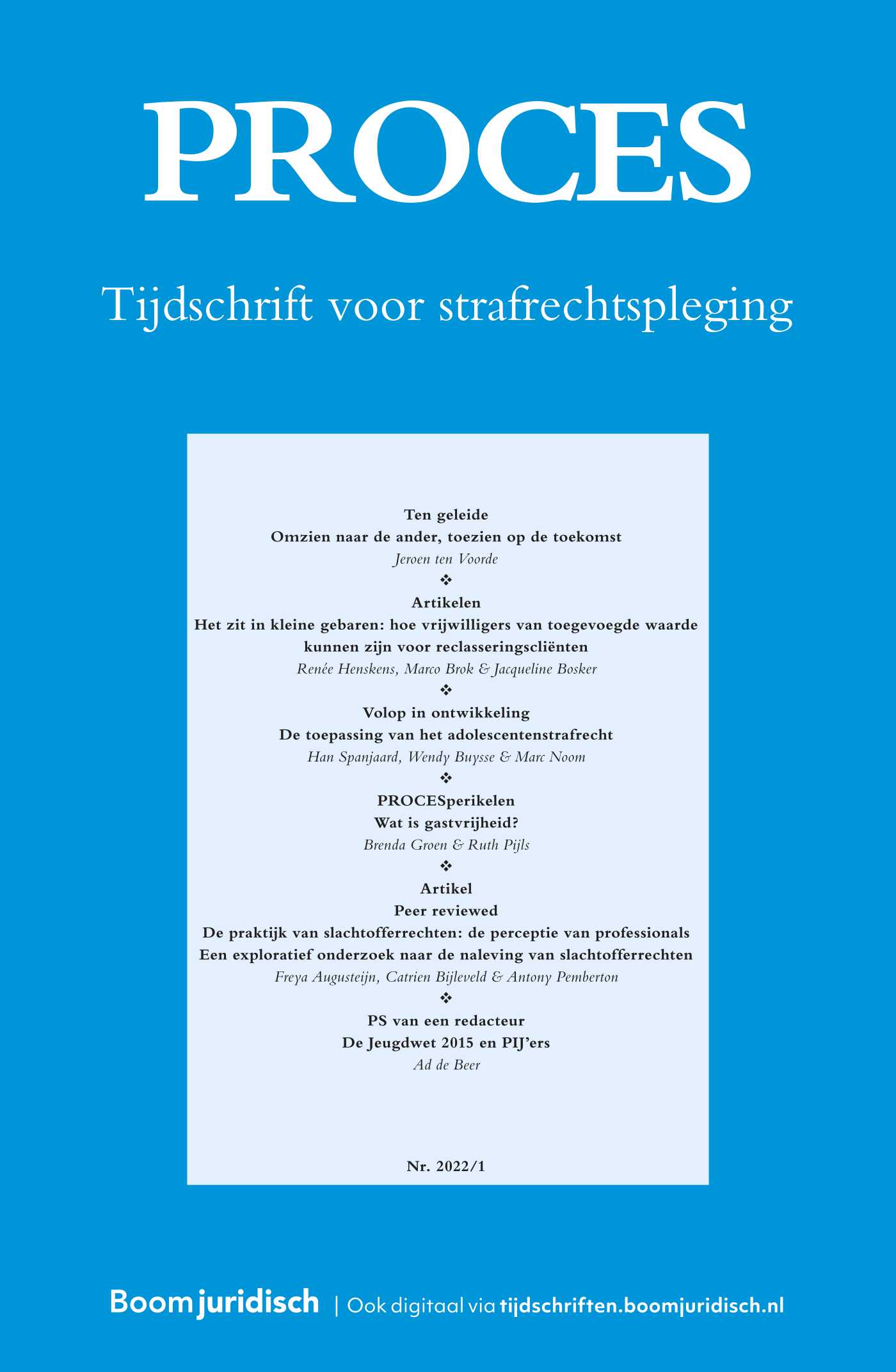|
This study tests whether adolescents who come in contact with criminality in their family, have a greater chance of committing crimes themselves. To do so, it uses new CBS-data that makes it possible to analyze the criminality of all adolescents that live in the four biggest cities in the Netherlands in 2018, and their broad network of family members – parents, siblings, grandparents, uncles, aunts and cousins. The results confirms prior research and show that the chance of a police registration for adolescents is greater if their family members also have a police registration. |


PROCES
Meer op het gebied van Criminologie en veiligheid
Over dit tijdschriftMeld u zich hier aan voor de attendering op dit tijdschrift zodat u direct een mail ontvangt als er een nieuw digitaal nummer is verschenen en u de artikelen online kunt lezen.
| Ten geleide |
Hard cases: hoe compleet moet het verhaal zijn? |
| Auteurs | Tessa van der Rijst |
| Auteursinformatie |
| Peer reviewed |
|
| Trefwoorden | criminaliteit, familie, netwerk, jongeren |
| Auteurs | Anke Joustra, Zoë Driessen en Paul Nieuwbeerta |
| SamenvattingAuteursinformatie |
| Artikel |
Wijken waar gepraat wordtEen onderzoek naar de percepties van het contact tussen bewoners en politie op de Oostelijke Eilanden |
| Trefwoorden | sociale cohesie, politie, vertrouwen, samenwerking |
| Auteurs | Marlijn Peeters en Anouk Smeenk |
| SamenvattingAuteursinformatie |
|
A police team in central Amsterdam experiences difficulties in their contact with the local community. Partly due to a history of violence in the neighbourhood. They aspire to improve the contact. A qualitative empirical study was conducted by interviewing police officers, community workers and residents. With the aim to explore all perspectives from involved actors. The perception of difficult contact is confirmed by both the police, community workers and residents. It seems to be related to communication after incidents and reporting to the police. There are opportunities to become more approachable in this closed community and to improve the response after an informal report to the police. In this article the outcomes of the empirical and theoretical study are presented and recommendations are towards the police team and the local government. |
| Artikel |
Een zelfstandige strafbaarstelling van psychisch geweldVoor- en tegenargumenten, en hoe nu verder? |
| Trefwoorden | psychisch geweld, (psychische) mishandeling, criteria voor strafbaarstelling |
| Auteurs | Robert Timmers, Wilma Dreissen en Janine Janssen |
| SamenvattingAuteursinformatie |
|
The central question in this article is which arguments argue in favor of or against an independent criminalization of psychological violence, and what further research should focus on. Arguments in favor of independent criminalization are found in the standardization and recognition of psychological violence, better awareness, a higher willingness to report crimes and a negative incentive for aid. The objections to separate criminalization consist in provability problems, psychological violence is already punishable, existing (less drastic) alternatives to criminal law and objections based on the lex certa-principle. Finally, the doctoral research conducted by co-author Timmers in this field is discussed. |
| PROCESperikelen |
Forensische zorg(en) |
| Auteurs | Johan van Wilsem, Marco van Maasacker en Jooske de Sonnaville |
| Auteursinformatie |
| Artikel |
Balanceren tussen veiligheid en zorgDrie visies van penitentiair inrichtingswerkers over hybride werken |
| Trefwoorden | penitentiair inrichtingswerkers, zorg en veiligheid, hybride werken, Q-methodologie |
| Auteurs | Marie-José Geenen en Diana Kaddouri-Tedeschi |
| SamenvattingAuteursinformatie |
|
In todays prisons, officers have to keep a balance between safety and care. By means of Q methodology, opinions of prison officers have been collected on this topic. Three opinions are distilled. For care first the starting point is giving care, for safety first the safety of staff and detainees must be guaranteed before giving care, for the third opinion, recovery first, care and safety must be at the service of the reintegration of the detainee. It is advisable to take these three profiles into account in coaching and training. |
| PS van een redacteur |
‘Knock, knock…’ Humor in de rechtszaal |
| Auteurs | Sigrid van Wingerden |
| Auteursinformatie |
| Rectificatie |
Rectificatie |
| Call for papers |
Call for papers |

